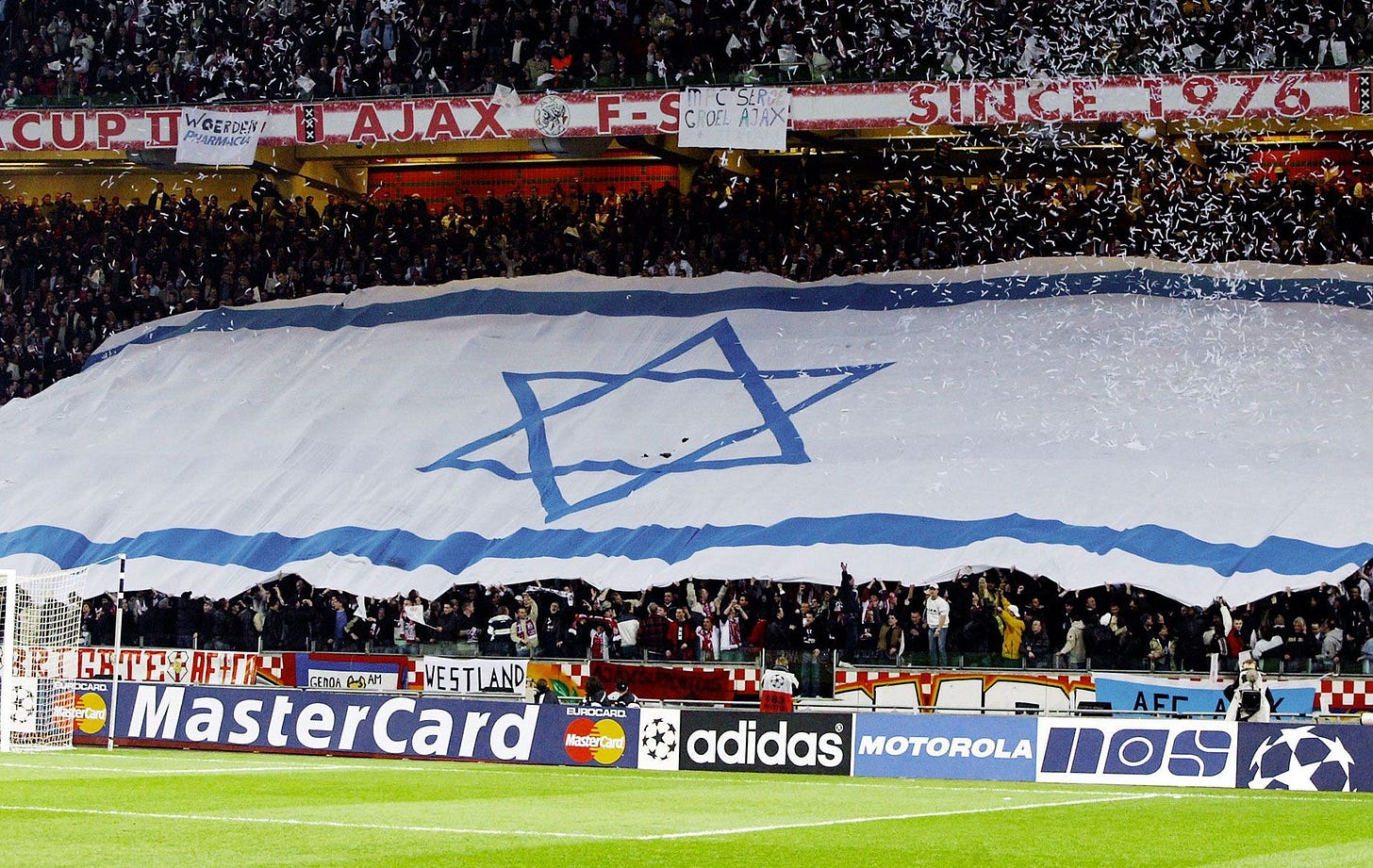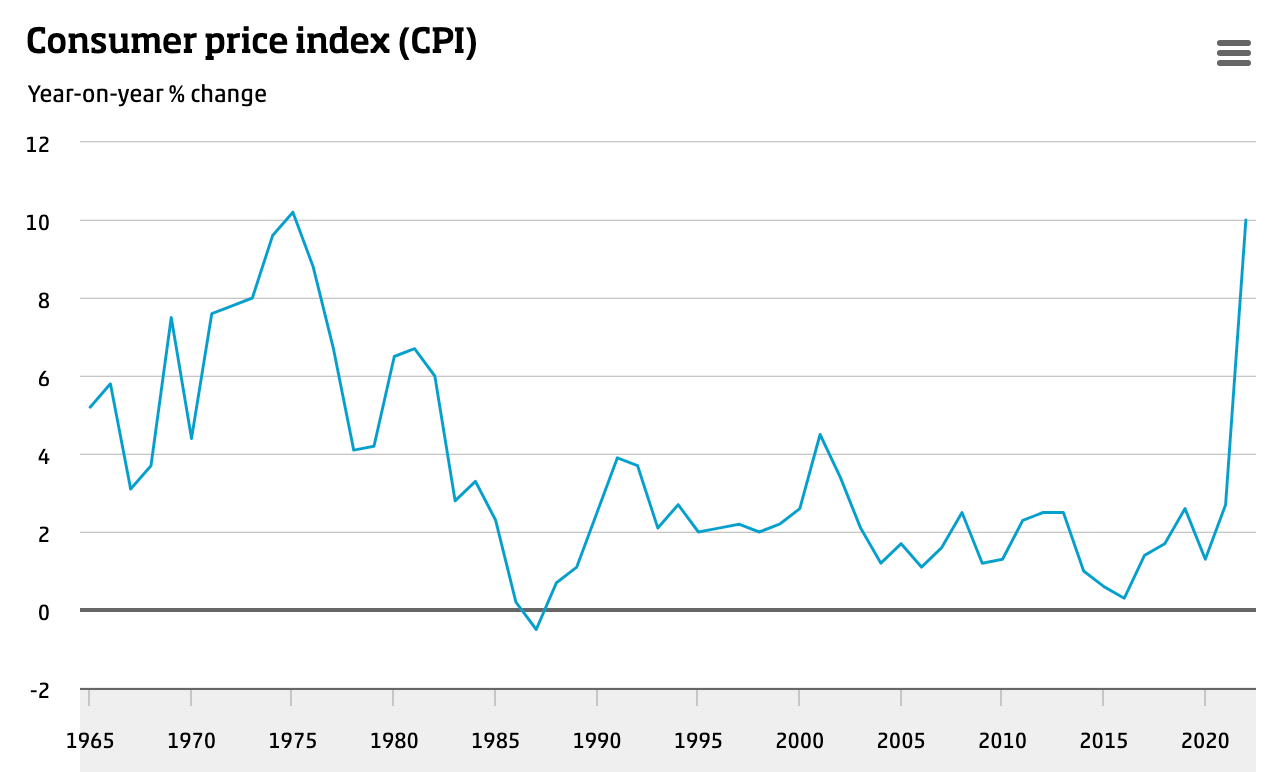Why Amsterdam football fans call themselves 'Super Jews'
Plus: What makes Dutch labor strikes Dutch. Fun stuff at the end.

Last weekend police arrested 154 AZ Alkmaar fans, en route to an AZ-Ajax match, for singing anti-Semitic songs in the Amsterdam metro.
My jaw actually dropped reading this news just two days after Remembrance Day, a national holiday I wrote about last week, which honors victims of the Holocaust and Dutch war deaths since the beginning of WWII.
Football hooligans chanting Anti-Semitic songs in Amsterdam, a city where thousands of Jews were deported and murdered during the war?
Super Jews
I looked into it and learned that Ajax supporters refer to themselves as “Super Jews.” They wear or have tattoos of the Star of David; wave the Israeli flag; and chant traditional Jewish songs like “Hava Nagila,” or their own, including “Jews Jews Jews” (“Joden Joden Joden”) at matches.
Very few (if any) of these fans are Jewish.
The simplest and most-cited explanation for this phenomenon is that before WWII around 70,000 Jews lived in Amsterdam, and many were Ajax supporters since the arena at the time was located close to the Jewish community.
As Wim Schoevaart, an Ajax archivist who died at 94 years old in 2013, elaborated in an interview for the documentary Superjoden van Ajax:
They liked to watch Ajax because Ajax played good football. And the fact has remained that Ajax is a Jewish club. Because Ajax had a large, strong Jewish following before the war.
It is always like this with Jewish people: they go to see good things. The Italian opera at Theater Carré was also always full of Jewish people. Because the quality was there. They got quality for their money.
But (obviously) Ajax supporters haven’t been waving the Israeli flag since before WWII straight up until now. In 2005, an Ajax supporter explained how something changed in the 1970s, around the same the F-side, an Ajax hooligan group, was founded:
About thirty years ago, the other teams’ supporters started calling us Jews because there was a history of Jews in Ajax, so we took it up as a point of pride and now it has become our identity.
Maybe this logic sounds familiar. “Reappropriation” is the process of reclaiming a term previously used to denigrate a group. Queer, bitch, or dyke are good examples.
But that logic doesn’t work here; you can’t reappropriate Jew if you aren’t Jewish.
Ronald Pieloor, a fan also interviewed in Superjoden, hints at a different motivation: deliberate, hooliganistic provocation.
The Star of David always provoked a reaction from the other supporters. And Ajax supporters responded to that. So at some point that started to take on a life of its own.
Anti-Ajax means anti-Semitic

The chants of non-Ajax hooligans are atrocious, and have been since the 1970’s:
“Hamas, Hamas, all Jews to the gas.” video
“My father was in the commandos, my mother was in the SS. Together they burned Jews, because Jews burn best.” video
“We’re going on a Jew hunt.” video
“Hey dirty cancer Jew, you’re going to drop dead.” video
Over the years there have been many ineffective attempts—fines and educating fans—to get hooligans on both sides to stop with their chants.
Many Ajax supporters see Jewishness as inextricably as part of their identity as fans, and the anti-Semitism as not their problem besides. “We don't say anything that hurts anyone,” a fan told the New York Times. “Even if we stopped, they'd still call us Jews.”
Anti-Semitism on the rise in the Netherlands
There were 144 reported incidents of anti-Semitism in 2022, up from only 20 in 2018.
On New Year’s Eve, a neo-Nazi text was projected on the Erasmus Bridge in Rotterdam. In January, a report showed that twenty-three percent of Dutch Millennials and Gen Z members “believe the Holocaust is a myth or the number of Jews killed is greatly exaggerated.”
In February, the text ‘Ann Frank invented the ballpoint pen,’ an extreme-right, anti-Semitic suggestion that her diary was a forgery, was projected on the Anne Frank House in Amsterdam.
And now we have last weekend’s 154 arrested hooligan chanters to add to this list.
Bigotry and absurdity
This all reminded me so much of how the extreme right flourished online towards the end of 2010’s. Memes that started out funny and light-hearted, like Pepe the Frog, became tools of the alt-right precisely because their funny, light-heartedness left room for hatred to creep in initially unnoticed. Or at least not seen for what it was.
As Whitney Phillips, an early promoter of “meme culture” told The Atlantic:
What seemed to be fun and funny ended up functioning as a Trojan horse for white-supremacist, violent ideologies to shuffle through the gates and not be recognized.
Too many of us just didn’t see it, or if we did, we just didn’t think it was real misogyny. The mystique of lulz, the fun of lulz, was too ethically paralyzing.
Similarly, Ajax supporters in the 1970’s called themselves Jews for ostensibly not-hateful reasons—to develop a collective identity and incite fans of other teams.
Not hateful, but not exactly innocent, either. Nazis deported Jews from Amsterdam only thirty years before Ajax claimed the term. What did they expect to incite?
What makes Dutch labor strikes Dutch

A strike at distribution centers led to bare shelves at Albert Heijn branches across the Netherlands this week.
Interesting, because the Dutch tend not to strike much. Between 2013 and 2019, France had an annual average of 128 strike days per thousand workers, Belgium 98, and the Netherlands? Only 16.
There have been four times more strikes than the annual average already this year, in different sectors: hospitals, municipalities, regional transport, and retail. Even employees of a labor union are striking!
So why are the Dutch striking now? A bad combination of inflation, stagnant wages, and big time corporate profits.
How to piss off your employees

In 2022, while six out of ten Dutch households struggled to make ends meet, Dutch multinationals used the opportunity to rake in a shitload of cash.
Last year Shell earned its highest profit in a century—38 billion euros. Unilever's profit went up 25 percent; Heineken's by 31 percent.
The profit of the parent company of Albert Heijn, Ahold Delhaize—the 10th largest Dutch company by market cap, which also owns Gall & Gall, Etos, and Bol.com in the Netherlands—increased by 13 percent.
And Ahold CEO Frans Muller was paid more than 6.5 million euros in 2022. That’s 128 times the average Ahold salary of 51,000 euros.
“Grab inflation”

According new research, in 2022 many companies increased their prices more than rising costs justified.
If companies had not increased their selling prices beyond what would have been minimally necessary to maintain their profit, the increase in 2022 could theoretically have been 2.2 percentage points lower.
So some of last year’s massive corporate profits came from companies passing on the cost of inflation to consumers… and not passing the profits onto workers.
A labor union study of publicly traded Dutch companies found that in 2022, distributions to shareholders rose “explosively”—59% higher in 2022 than in 2019—while personnel costs only increased by 12%. Prior to the AH strike, the director of the CNV union noted:
Top management has already amply compensated itself for [the 10% increase in inflation in 2022]. But employees only received a 2.75% [pay increase] last year. Albert Heijn will really have to work with them.
In March, vice-chairman of the FNV labor union Zakaria Boufangacha said that their members were willing to strike because they “see that good profits are still being made, while they have to cut back on their expenses due to sky-high inflation."
What makes a Dutch strike Dutch?
It’s a busy period of strikes all over the world: French road and rail workers; American screenwriters; English rail workers, postal workers, nurses, ambulance drivers, and teachers; and South Korean truck drivers. To name a few.
But Dutch strikes have their own unique character; they are typically shorter, and less disruptive to society than in other countries. This has historical origins: during post WWII-reconstruction, employers and the government agreed to a central wage policy with labor unions. Unions having a seat at the table “led to decades of relative peace at work.”
Former FNV chairman Lodewijk de Waal explains:
It is quite different in [England and France], where people strike earlier than in the Netherlands. In the Netherlands it is the last option… So if you go on strike in the Netherlands, you know that something is really happening.
Boufangacha sees it the same way:
I cherish the Dutch model in which we, as employers and employees, look for consensus. That has brought us a lot in recent decades. We talk first before we take action.
Making Dutch strikes a last resort, rather than a first line of defense.
🥳 LEUKE DINGETJES
Every week, the city of Rome sends nine hundred tons of household waste to Amsterdam by train. The trash is incinerated at waste-to-energy company AEB, which processes trash from all over Europe.
Amsterdam makes 1.5 million euros per month off the deal.
Rembrandt tattoo anyone?
“In one of the more extreme attempts to attract a younger audience post-Covid, the newly renovated [Rembrandt] museum in Amsterdam is launching a ‘poor man’s Rembrandt project’ for a week in June.” via the Guardian.
A new single from Tramhaus
The Rotterdam post-punk group made it to KEXP Song of the Day last year with a “Make it Happen,” a track that played off Rotterdam’s city slogan.




